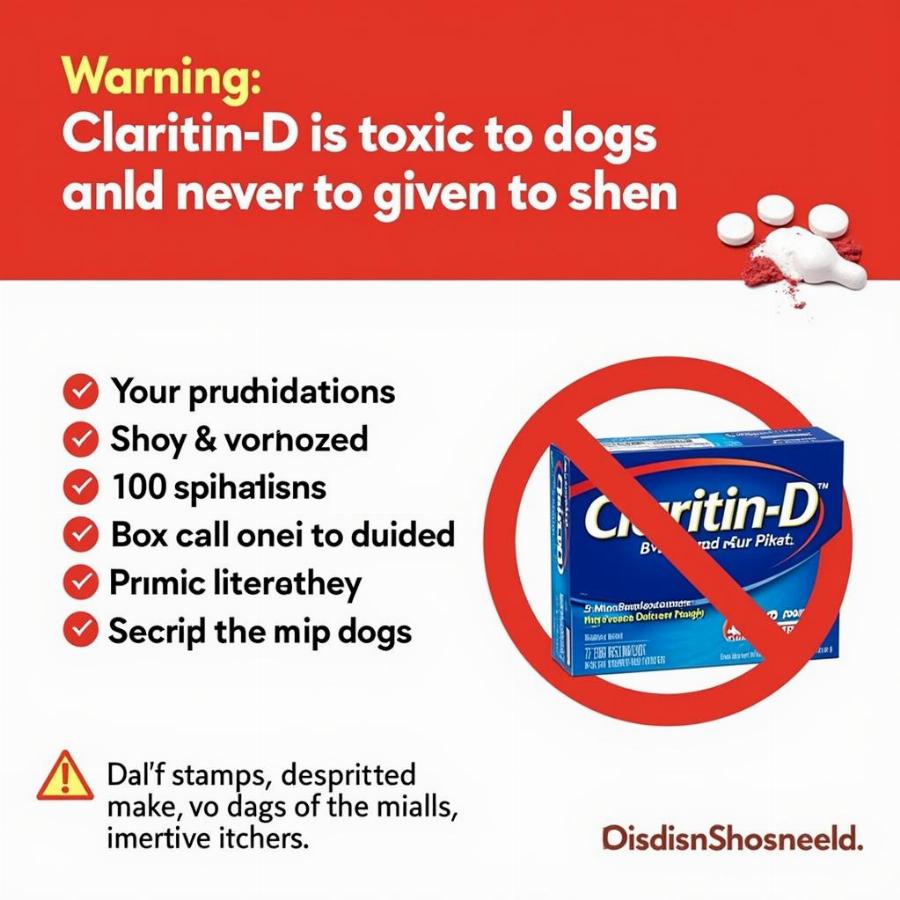Claritin, a common over-the-counter allergy medication for humans, is a frequent topic of discussion among dog owners seeking relief for their itchy companions. But is Claritin truly safe and effective for our canine friends? This comprehensive guide dives deep into the topic, exploring the safety, usage, potential side effects, and alternatives to Claritin for dogs suffering from allergies.
Understanding Allergies in Dogs
Just like humans, dogs can experience various allergies, ranging from environmental irritants like pollen and dust mites to food sensitivities. These allergies can manifest in several ways, including:
- Itching and scratching: This is often the most noticeable sign, with dogs excessively licking, chewing, and scratching their skin.
- Skin redness and inflammation: Allergic reactions can cause the skin to become red, inflamed, and irritated.
- Hair loss: Constant scratching and licking can lead to patches of hair loss.
- Ear infections: Allergies can predispose dogs to ear infections, characterized by redness, swelling, and discharge.
- Respiratory issues: In some cases, allergies can trigger sneezing, coughing, and difficulty breathing.
Is Claritin Safe for Dogs?
The short answer is: sometimes. While not FDA-approved for veterinary use, Claritin (loratadine) can be used in dogs under the guidance of a veterinarian. It’s crucial to consult your vet before administering any medication to your dog, even over-the-counter ones. They can determine the appropriate dosage and assess any potential risks based on your dog’s individual health profile.
Claritin Dosage for Dogs
Never guess the dosage. Your veterinarian will determine the safe and effective dosage of Claritin for your dog, typically based on their weight. Giving the wrong dosage can be harmful.
Potential Side Effects of Claritin in Dogs
While generally considered safe when administered correctly, Claritin can cause side effects in some dogs. These may include:
- Dry mouth: This is a common side effect and usually not a cause for concern.
- Drowsiness or lethargy: Some dogs might become more sleepy after taking Claritin.
- Vomiting or diarrhea: These are less common but can occur in sensitive dogs.
- Increased heart rate: In rare cases, Claritin can cause an increase in heart rate.
If your dog experiences any adverse reactions after taking Claritin, contact your veterinarian immediately.
When to Contact Your Veterinarian
If your dog shows any signs of allergies, consult your veterinarian. They can diagnose the underlying cause and recommend the most appropriate treatment. Do not attempt to self-medicate your dog.
Alternatives to Claritin for Dogs
Several alternatives to Claritin can help manage allergies in dogs. Your veterinarian might suggest:
- Other antihistamines: Zyrtec (cetirizine) is another antihistamine that can sometimes be used in dogs, but again, only under veterinary guidance.
- Apoquel: This prescription medication specifically targets itch associated with allergic dermatitis.
- Cytopoint: This injectable medication helps control itching related to allergic skin disease.
- Steroids: In severe cases, corticosteroids might be prescribed to reduce inflammation and itching.
- Allergy testing and immunotherapy: This can help identify specific allergens and desensitize the dog’s immune system.
Can I give my dog Claritin-D?
Absolutely not. Claritin-D contains pseudoephedrine, a decongestant that is toxic to dogs. Even small amounts can cause serious health problems, including seizures, tremors, and even death.
 Claritin-D nguy hiểm cho chó
Claritin-D nguy hiểm cho chó
Preventing Allergies in Dogs
While not all allergies are preventable, some measures can help reduce your dog’s exposure to allergens:
- Frequent bathing: Regular baths can help remove allergens from your dog’s coat.
- Cleaning your home: Regularly vacuuming and dusting can reduce allergens in your environment.
- Hypoallergenic bedding: Using hypoallergenic bedding can minimize exposure to dust mites.
- Dietary changes: If your dog has food allergies, a special diet might be necessary.
Claritin for Dogs: Key Takeaways
Claritin (loratadine) can be used for dogs under veterinary guidance, but never give your dog Claritin-D. Always consult your veterinarian before giving your dog any medication, including over-the-counter drugs. They can determine the proper dosage, assess potential risks, and recommend the most appropriate treatment for your dog’s specific needs.
FAQs about Claritin for Dogs
- What should I do if my dog accidentally ingests Claritin-D? Contact your veterinarian or an emergency animal hospital immediately.
- How long does it take for Claritin to work in dogs? It can take 1-2 hours to see the effects of Claritin.
- Can I give my dog Claritin every day? Only if directed by your veterinarian.
- Are there any natural remedies for dog allergies? Some owners find relief with supplements like omega-3 fatty acids, but always consult your vet before trying any new remedies.
- Can puppies take Claritin? Consult your veterinarian before giving Claritin to a puppy.
Further Reading
You might be interested in these other articles on Beaut Dogs:
Beaut Dogs: Your Trusted Source for Dog Care
Beaut Dogs is dedicated to providing dog owners with reliable and expert advice on all aspects of canine care. From breed selection to nutrition and health, we’re here to help you navigate the wonderful world of dog ownership. When you need support, please contact Email: [email protected] to get detailed and accurate answers from Beaut Dogs.